by Leon Pantenburg
Disclaimer: Irish Setter supplied the product for this review. I don’t work for the company, and I was not paid to write a review. At the time of publication, there was no affiliate relationship between Red Wing Shoe Company and Survival Common Sense. All we ever promise is a fair and unbiased testing and review.
A long, long time ago, in a place far, far away called Idaho my hunting partner, Michael Pantenburg and I covered a lot of ground while backcountry hunting. We walked all day while we glassed, hiked and traveled over rough country to locate an elk herd. We’d try to rendezvous about noon. If an animal was down, we’d go take care of it. If not, we’d figure out the afternoon hunt. We’d plan on being back at camp about dusk. The all-day walking required sturdy boots, but ones that weren’t too heavy.
Finding your best hunting boot depends on a lot of unique factors, such as physical condition, terrain, the game being hunted, and how much walking is anticipated. Over the years, I figured out what were the best elk hunting boots for me.

Mike crosses the Salmon River on an elk hunt. In this case, the best hunting footwear was waders!
Well, some 30 years later, those days are gone. But my hunting days are not. Nowadays, I track down mushrooms, and hike and forage for wild edible plants. There are a lot of similarities between mushroom and big game hunting. You should be proficient in land navigation, have the right gear along, and constantly be on the move.
And you will do a lot of walking on uneven terrain in both pursuits. That’s where these Irish Setter VaprTrek™ might come in.
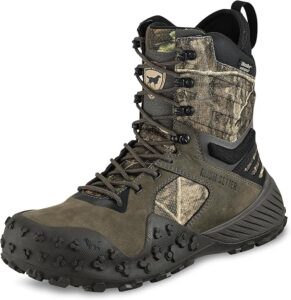
The VaprTrek 3941 is a rugged, lightweight hunting boot.
Vaprtrek™
Technical Specifications – VaprTrek™ style 3941
- Height: 8-inch
- Waterproof: UltraDry™ Waterproofing System
- Leather Type: Full Grain, Waterproof
- Camouflage: Realtree® APX Camouflage
- Fabric / Material: Abrasion Resistant Nylon
- Construction: Cement
- Footbed: Polyurethane Foam
- Shank: Nylon
- Insole: Non-woven
- Outsole: Rubber Hex Lite – Gray
- Last: R100
- Lining: Recycled Combat Super Knit
- Sourcing: Globally Sourced
- Re-sole ability: None. When the soles wear out, the boots are done for.
The only hunting I’ve done while wearing the VaprTreks so far was for mushrooms, and the boots were great for that. I also wore them dog walking, hiking and when I climbed Pilot Butte in Bend, Oregon. These boots will get wrung out soon when the hunting seasons open.
Here’s how the boots worked out
- My go-to hunting boots are generally uninsulated, ankle-high leather boots that don’t have a moisture barrier. They have a fairly aggressive sole pattern. This style of boot has proven itself in New England mountains, Mississippi Swamps and mountains in Idaho and Oregon. The VaprTreks fall in this category, so that’s already one strike in their favor.
For winter hunting, I go with eight-inch insulated boots with an aggressive sole. The VaprTreks also have an insulated version for cold weather hunting.
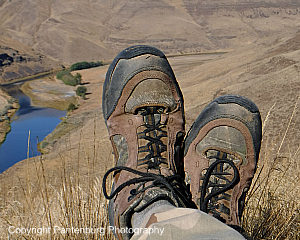
These Danner Cougars served me well and were used hard.
Last R100: A shoe last is a model of a foot that determines the shape and fit of a shoe or boot. This particular pattern works for me very well. I generally wear size 11 wide boots, and the R100 seems to be designed for my size feet. I wear the VaperTeks with thick wool or alpaca socks, and possibly a felt insole. This sized boot works well for me with my insole and sock preferences.
UltraDry waterproof: I live in the Oregon high desert, so waterproof boots are generally not needed nor desirable. And for the most part, IMO, waterproof liners leave a lot to be desired. That said, these boots don’t appear to be excessively warm, even for the hot days I wore them on. For an upland game hunter traipsing muddy cornfields, wetlands or brushy ravines, the inner heat probably won’t be a big deal, while the waterproofing may keep feet dry. A lot depends on the activity level and the terrain. My winter elk hunter boots are waterproof, but they must be taken off at night and dried.
ScentBan: An Irish Setter exclusive scent control process, ScentBan™ is added to various materials from leathers to linings to footbeds, killing bacteria that cause odors. As best I can tell, it works fine. We’ll see how the ScentBan plays out after a several-day backpack backcountry hunt.
enerG: “Strategically placed high-rebound material brings high-end athletic shoe technology to more practical applications, delivering a recharging burst of energy with every step.” (Website) I haven’t been able to tell one way or the other. It seems like a good idea. More on this later.
- Realtree®: Realtree camo was designed to melt into the background. Different patterns have been created including one for fowl hunters who live in the marsh and one for western open spaces.
- The jury is out on camo boots. I have both camo and regular boots, and I haven’t been able to tell any particular visibility advantage.
- In a deer stand or duck blind, nobody is going to notice your boots, particularly if they get muddy (which mine always seem to do.) The camo pattern may limit where you can wear these boots – you may not want to wear camo shoes with semi-casual clothing. Manufacturers will keep making camo pattern boots as long as consumers keep buying them,
- There’s this:
Sole pattern: This is another personal aspect. I want an aggressive pattern for mountain or woodland hunting. There are few situations slicker than dead, deciduous leaves on clay sidehills in the rain. On the other hand, an upland hunter wants a lightweight boot that won’t pick up mud. The VaprTreks have a relatively open sole pattern, particularly suited for the uplands.
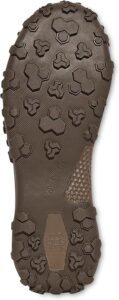
The sole pattern is relatively open. This would make it a good boot for muddy conditions.
Socks: Wait – this is boot review, right? But every footwear review should take into account the material of the socks that will be worn in them. I love my alpaca socks.
- Socks are one of the most important parts of boot fit and wear. Get a boot size that allows room for thick socks of the proper material. The absolute worst combination, IMO, is cotton socks inside waterproof boots in warm weather. Put some cheap cotton athletic socks inside these VaprTreks, and go hiking. Through no fault of the boot, you will probably end up with soft, uncomfortable feet.
Cotton absorbs significantly more water than any other fabric. To put it in perspective, cotton can absorb up to 2,700% of its weight in moisture. When cotton fabrics become wet, they lose their ability to insulate. All waterproof linings are supposed to dissipate moisture as it is created, but I haven’t found a liner yet that can. I have high hopes for the UltraDry waterproofing.
-
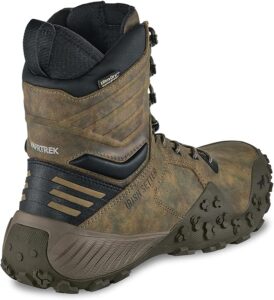
The rand has multi-directional grips.
- Rand: The material you see around the sides, back, and front of a shoe is generally referred to as a rand. It is supposed to protect the sides of the boot from scratching, rubbing and wear.
- “The full-wrap rubber Hex Lite sole with multi-directional grips the terrain no matter how hard you’re hunting. The outsole pattern features multi-directional lugs to grab ground in every direction and provide excellent underfoot traction.” This is according to the website.
- Hmmm… this might work really well for chuker hunters, where the terrain is steep, rocky and rough.
Full Grain Leather: Full-grain leather is the durability champ, IMO. But breaking full leather boots in can be a long process. The VaprTreks were typical full grain leather boots – they started out feeling stiff, but as I wore them more, they loosened up and became more comfortable. Any full grain leather boot is going to require a lengthy break-in period, so don’t take these boots hunting without wearing them a lot before hand.
DO YOU NEED VAPRTREKS BOOTS?
So far, these boots check all the boxes for me. I look forward to using them upland bird hunting, and mountain deer hunting. I’ll keep you updated!
Please click here to check out and subscribe to the SurvivalCommonSense.com YouTube channel – thanks!

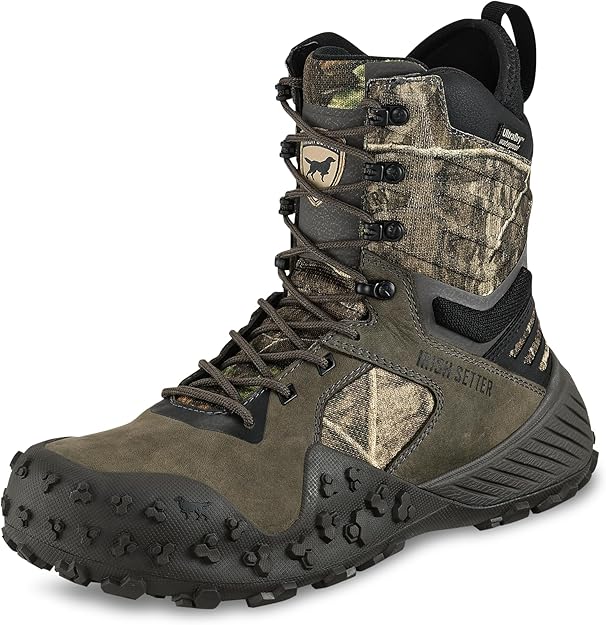

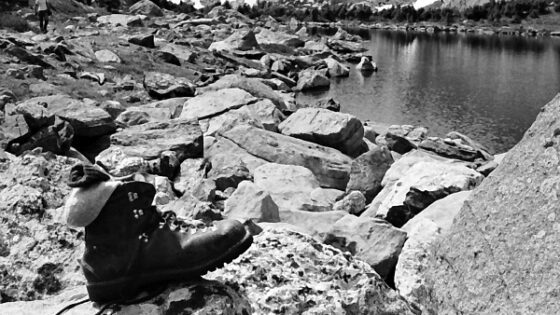
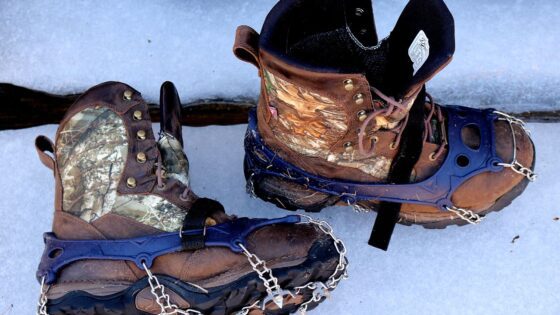
Leave a Reply